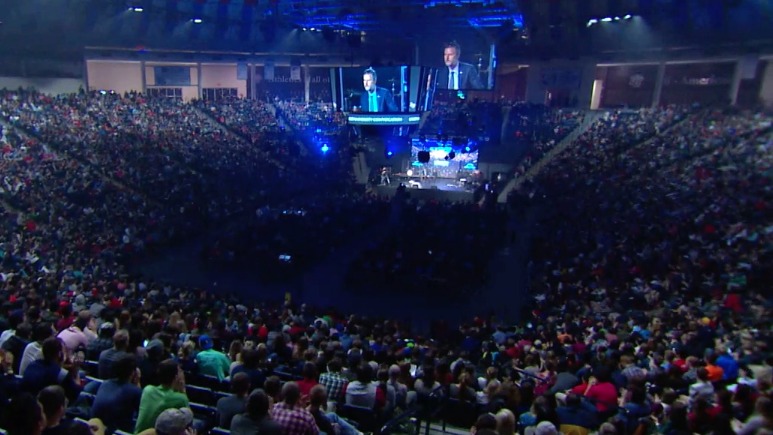It was the cheers that shook me. They echoed around in the dome of the stadium, the outpouring of more than 10,000 Liberty University students during our weekly convocation.
The school’s president, Jerry Falwell Jr., boomed from the speakers, spurring them on. He reached for his back pocket and referenced the pistol he had there. Then, he encouraged the rest of us to arm ourselves as well, in case “those Muslims,” ever showed up at our Christian college.
Some of us just stared in disbelief. As for the rest, perhaps they were excited to have someone speaking up about gun rights, a topic many conservatives feel passionate about. Perhaps they’d been waiting for an opportunity to release the pain and powerlessness over yet another attack on American soil. Perhaps they didn’t realize the exact implications of what Falwell was saying. Regardless, it turned out that their enthusiasm wasn’t limited to our Lynchburg, Virginia, campus. As Falwell’s call to arms spread in the news, I saw fellow “gun-clinging, Bible-toting American patriots” from across the country offering their support.
There are people at Liberty who believe carrying guns to protect ourselves against attack makes a statement about what our school stands for. As a Christian who values life in all circumstances, I simply cannot agree. The cheers in the stadium that morning contradict our claims to valuing every life on this earth. Applauding while someone speaks about killing anyone—even Islamic terrorists—is unacceptable when we believe that every life is valuable from the point of conception into eternity.
Even when we agree that the world is a safer place without terrorist masterminds and jihadist attackers, we can still grieve rather celebrate their killing. A Leadership Journal article addressed the mixed responses to Osama bin Laden’s death, saying:
How evil are the designs of Satan, how corrupting the nature of sin to take humans created in God's image and twist them so far from his purposes—to the point that creation is better off without them? The snuffing out of God's image, no matter how twisted it has become, is a solemn event.
Many Christians side with Falwell—son of the late Liberty founder and Moral Majority leader Jerry Falwell—regarding gun ownership and concealed carry on campus. And I appreciate his desire as president to protect and care for the students and staff at Liberty. Guns are not the biggest problem here, though; it’s the tone of our conversation over guns—and killing.
In front of the student body, and in a video now made public to the watching world, Falwell riled up the crowd saying, “Let’s teach ‘em a lesson if they ever show up here,” after a few laughing asides and a sort of confident swagger, including asking whether he should pull out his gun on stage. He incited a reaction in the student body, booming in response to each mention of gun rights and the failure of gun control to protect us. While he has clarified that it was not his intent to overgeneralize and speak so harshly of the Muslim faith overall, that was the rhetoric he chose at the time (“those Muslims”).
As Tyler Huckabee wrote for Relevant:
Falwell speaks for the largest Christian university in the United States, and publicly calls for death to thunderous applause. Even if we allow for the distinctly unlikely possibility that Falwell or one of his students would ever have the opportunity to shoot and kill radicalized Islamic terrorists, ought the response really be one of—there's really no other way to put it—celebration? Shouldn't our reaction to violence elicit a slightly different response than a Monday night touchdown?
And yet, Falwell’s remarks and the crowd’s response are not entirely surprising. What he said last week fits in with some of the recent political rhetoric about Muslims and terrorism. Most recently, Donald Trump suggested a ban on Muslims entering this country, following the attacks in San Bernardino and Paris. People continue to admire his fast and bold talk (“he actually says what the rest of us are thinking!”), but inflammatory speech—no matter how big the platform—often does more harm than good.
When Falwell grouped all Muslims together and used it as a label to refer to terrorists in particular, that kind of dangerous generalization misrepresented and demeaned their faith. Such attention to language doesn’t come out of a desire to be “politically correct,” but to speak the truth.
Moreover, any leader’s discriminatory or bigoted comments should be shut down with a lack of applause and support, not greeted with cheers and a flurry of Facebook likes and retweets on Twitter. In huge crowds where people can easily get wound up into a hive mind (or even in the echo chamber of social media), we need to use extra caution about when and how we demonstrate our support.
As Christians, it is our calling to take the side of the weak, the one who faces injustice. And in today’s political climate some of those are people of Muslim faith who have unjustly suffered suspicion, discrimination, and even hate crimes in the aftermath of attacks by extremists. We don’t have to agree with them on religious grounds to support their rights as citizens of this country.
Proverbs 12:18 says, “There is one whose rash words are like sword thrusts, but the tongue of the wise brings healing.” Our nation needs healing. It is up to us to use our minds, words, and bodies to think, speak, and act critically our surroundings. In God’s name, we can work to counter our cultural celebration of violence and division and replace it with the hope of the gospel.
Moriah Wierschem is a sophomore at Liberty University and competes on Liberty's debate team.









